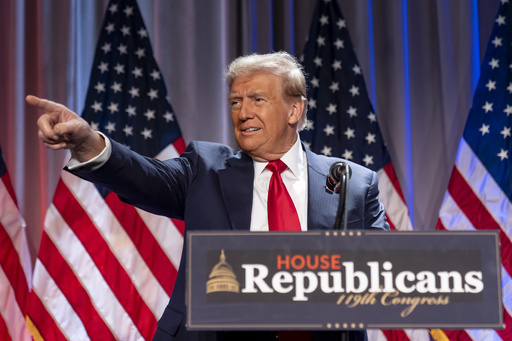WASHINGTON — During his initial term, Donald Trump often felt hurt and betrayed by the individuals he had appointed to significant positions. This time around, he is determined to avoid making the same mistakes.
As he seeks to build his administration once more, Trump has introduced a diverse and surprising array of candidates. While some of these individuals are personal friends, others are familiar faces from conservative media like Fox News. The range of experience varies greatly; some selections boast impressive backgrounds in their respective fields, while others appear to lack any relevant qualifications. His picks seem aimed at creating either shock or a sense of familiarity, and many are expected to foster a range of outcomes, from chaos to reassurance.
Trump’s current commitment to loyalty is clear, as he stands shoulder to shoulder with both new supporters and long-time allies. His team consists of those eager to carry out his directives—be they China hawks or advocates for peace. Unlike his previous tenure, where ideological infighting and leaks from his staff characterized the environment, the president is now focusing on eliminating infighting to better implement his agenda during his anticipated return to the Oval Office.
Marc Lotter, a former aide and current member of the America First Policy Institute, noted that Trump’s lack of connections and experience in Washington during his first term made it easier for some to manipulate him into adopting their views instead of his own. “If he makes a decision, he wants them to execute on it,” Lotter stated regarding Trump’s current expectations.
While it’s common for incoming presidents to choose trusted allies, critics express concerns that Trump’s new administration could be structured to minimize significant dissent against his policies. With the added grievances and a sense of vengeance, Trump now enters a political environment that offers far fewer checks on his power than before. He will take office again with a Republican-controlled Congress and a conservative Supreme Court comprising three justices he appointed, providing him with a sense of immunity from legal repercussions.
Trump has repeatedly stated that his biggest error during his first term was selecting inappropriate personnel. As an outsider unfamiliar with government workings, he admits he relied heavily on others’ recommendations. Now, he claims, “We did such a good job. But we’ll do a much better job now because I know the people now. I know the good ones, the bad ones. I know the weak ones, the strong ones. I know the stupid ones. I know the smart ones. I know them all.”
Much of his frustration stemmed from perceived incompetence amongst aides whom he regarded as “dumb” and weak, especially when pushback often characterized his more unorthodox directives. His first term showcased instances where aides would either stall or blatantly neglect orders they deemed unwise. For example, Trump faced backlash from national security officials over his directive to withdraw U.S. troops from Afghanistan immediately, which he later rescinded. Additionally, aides pushed back against his attempts to deploy active-duty troops to quell protests prompted by social justice movements in 2020.
In 2016, Trump had filled his cabinet predominantly with high-profile business figures, many of whom were steeped in the industries they were expected to regulate. This included individuals like Rex Tillerson, who was previously CEO of ExxonMobil before taking the helm at the State Department. However, this time around, Trump’s approach appears to be different.
Many of his current nominees lack extensive experience in their proposed roles. For instance, Lee Zeldin, selected to lead the Environmental Protection Agency, has minimal expertise in climate or regulatory matters. Similarly, Tulsi Gabbard, a former Democratic congresswoman positioned to oversee the intelligence community, has garnered attention for her pacifist stance on international issues. Even Pete Hegseth, a Fox News co-host tapped for Secretary of Defense, has no experience in dealing with the Pentagon whatsoever.
Trump’s aides assert that he is prioritizing individuals who share his “America First” ethos and can effectively execute his agenda, relishing the disruptive nature of his controversial selections. Karoline Leavitt, Trump-Vance Transition Spokeswoman, stated, “The American people reelected President Trump by a resounding margin giving him a mandate to implement the promises he made on the campaign trail—his Cabinet picks reflect his priority to put America First.”
Initially, some of Trump’s choices indicated a traditional trajectory, such as the selection of U.S. Rep. Michael Waltz, a retired Army officer, for national security adviser. However, several later appointments raised eyebrows and provoked alarm among critics. For example, his nomination of Florida Rep. Matt Gaetz for attorney general prompted concerns over potential retribution against Trump’s critics. Even some Republicans found the announcement hard to believe.
One of the most scrutinized selections is Hegseth as Defense Secretary. While he boasts military credentials, critics argue he is inadequately prepared for such a complex role. Matthew Waxman, a former senior official, expressed that despite Hegseth’s service, he lacks the seriousness required to manage the Pentagon effectively. He remarked, “I look at Hegseth and I say: He’s going to be 100 times better at waging culture wars than real wars if, unfortunately, we have to fight one.”
Overall, concerns have emerged regarding Trump’s focus on loyalty rather than governance in his choice of personnel, with Waxman labeling this inclination as dangerous for the nation’s leadership and global standing. One notable choice was Robert F. Kennedy Jr. to head the Department of Health and Human Services, who has been critical of federal health oversight and previously opposed the very vaccines Trump advocated for during the pandemic. Despite initial doubts about Kennedy’s viability in the cabinet, Trump’s choice highlights his unwillingness to heed cautionary advice.
